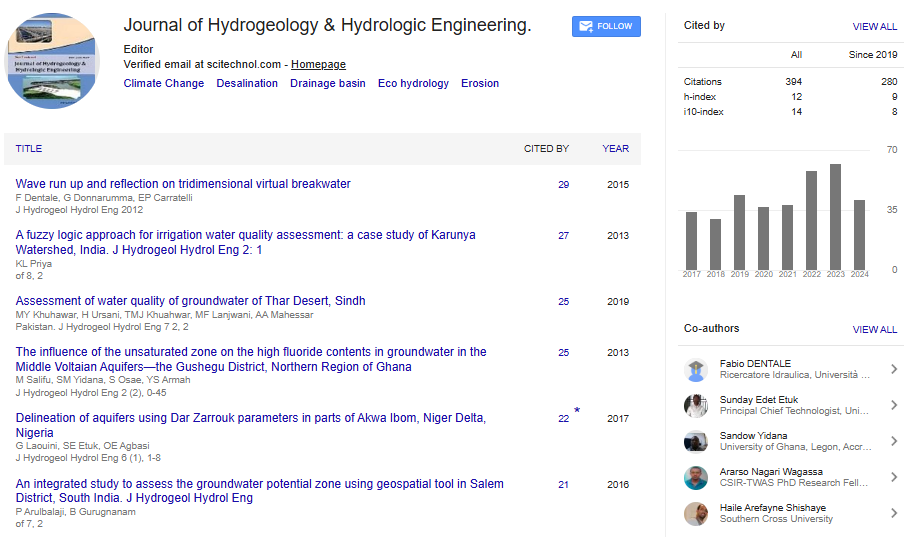Editorial, J Hydrogeol Hydrol Eng Vol: 0 Issue: 0
Water Energy Food Nexus in Sociohydrology
Linus H*
Department of Geography, Urban and Regional Economics, Ruhr University Bochum, University Bochum, Germany.
*Corresponding author: Linus H, Department of Geography, Urban and Regional Economics, Ruhr University Bochum, University Bochum, Germany, Tel: +123367597237; E-mail: linush@gmail.com
Received date: 01 August, 2021; Accepted date: 16 August, 2021; Published date: 25 August, 2021
Keywords: Hydrology Modelling Ecohydrology Hydrochemistry Hydroinformatics
Introduction
Water plays a key role in many SDGs, and so, water management should account for these multiple interacting objectives, not simply that specialize in clean water and sanitation. as an example, water is at the center of current analysis within the water-energy-food nexus across all spatial scales of study reveals the multiple trade-offs and interconnections inside this nexus. He suggests that interdependencies between water and energy have largely centered on however few components move, instead of taking a additional holistic and comprehensive approach. The interactions, she argues, ar multiple and manifest itself at completely different scales. These vary from the employment of water to extract and transport energy sources, manufacture and convert energy, irrigate crops for biofuel production, and water intensive renewable energy. Energy is required for treatment, distribution, and transport of beverage and chemical process, in addition as for irrigation. Last, as mentioned on top of, waste treatment is energy intensive activity that plays a key role in making certain water quality and scheme protection.
Much analysis has been dedicated to evaluating the large water resources nearly embedded in internationally and regionally listed commodities, together with food and energy. Future sociohydrology analysis could attempt to represent these virtual flows of water so as to grasp the complete producer-consumer chain of economic product that need water. this may modify customers to spot the water resources infrastructure that's supporting their food and energy receipts, facultative higher accounting across SDGs. Critically, resolution these flows can modify customers to raised assess the exposure of their offer chains to water stress and shocks.
During the 2008 annual meeting of the planet Economic Forum, participants mixed up a higher understanding of the link between economic process and (virtual) water flows. causative logical thinking analysis in economic science has shown that international trade ends up in exaggerated economic process. Virtual water flows ar primarily a rescaled metric of international artefact trade (typically provided in mass [tons] or worth [$] units). it's so possible that virtual water trade additionally drives economic process, although future analysis is to verify this. Relatedly, recent causative logical thinking work by Dang and Konar has shown that trade openness reduces the number of water that the countries use in agriculture, with no impact to the commercial or total water use of countries. This analysis shows the typical impact of trade on water use. Future analysis could explore the implications of trade for water use in specific settings and time domains.
This work by Dang and Konar highlights the interconnected nature of food-energy-water systems and illustrates that policies in one system could have result effects to a different. Similarly, recent analysis by Deryugina and Konar utilized causative logical thinking strategies to grasp the impact of crop insurance on water use. They notice that crop insurance ends up in additional irrigation withdrawals in agriculture, primarily thanks to farmers deciding to grow additional water-intensive crops. Thus, these studies highlight that policies that are purportedly unrelated to water will have sudden consequences in terms of water consumptions. Similarly, the International Water Management Institute highlights however operating to attain the food SDG will have result effects for water. this means that the SDGs are reticulated, and efforts to figure toward the goal of SDG could have unintended consequences for alternative SDGs. Future sociohydrology analysis ought to aim to raised perceive the advanced interactions that exist within the food-energy-water nexus to boost our ability to handle all SDGs.
 Spanish
Spanish  Chinese
Chinese  Russian
Russian  German
German  French
French  Japanese
Japanese  Portuguese
Portuguese  Hindi
Hindi 
